Rafting down the Unbound Elwha
Air Date: Week of September 5, 2014
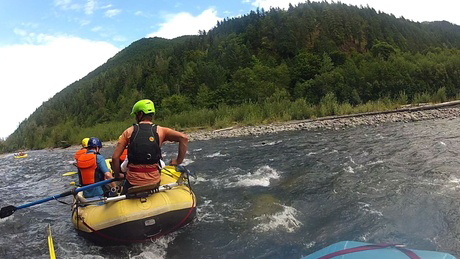 |
The National Park Service just finished removing the last dams that blocked the Elwha River for over a century in Washington’s Olympic Peninsula. The river now flows freely, open once more for salmon, otters, bears and rafters. Ashley Ahearn of EarthFix takes us for a ride down the river.
Transcript
CURWOOD: It's Living on Earth. I'm Steve Curwood. It cost $325 million, but now the largest dam removal project in U.S. history is finally complete. The Elwha River, which runs through the Olympic National Park in Washington state, now flows freely all the way to the sea for the first time in more than a century. Two massive hydropower dams blocked the Elwha and barred Chinook salmon and steelhead trout from swimming deep into the forest to spawn. But over decades, biologists, conservationists and Native Americans managed to convince Congress that the value of the dams for electricity was far less than the value of a flourishing salmon river; so now the dams are down, and the salmon are heading up. Ashley Ahearn, a reporter for the public media collaborative EarthFix, took to the water to see the river unbound.
AHEARN: If you were going to, say, try to raft a river while holding a microphone, Morgan Colonel is they guy you want at the helm. He’s been a river guide for ten years.
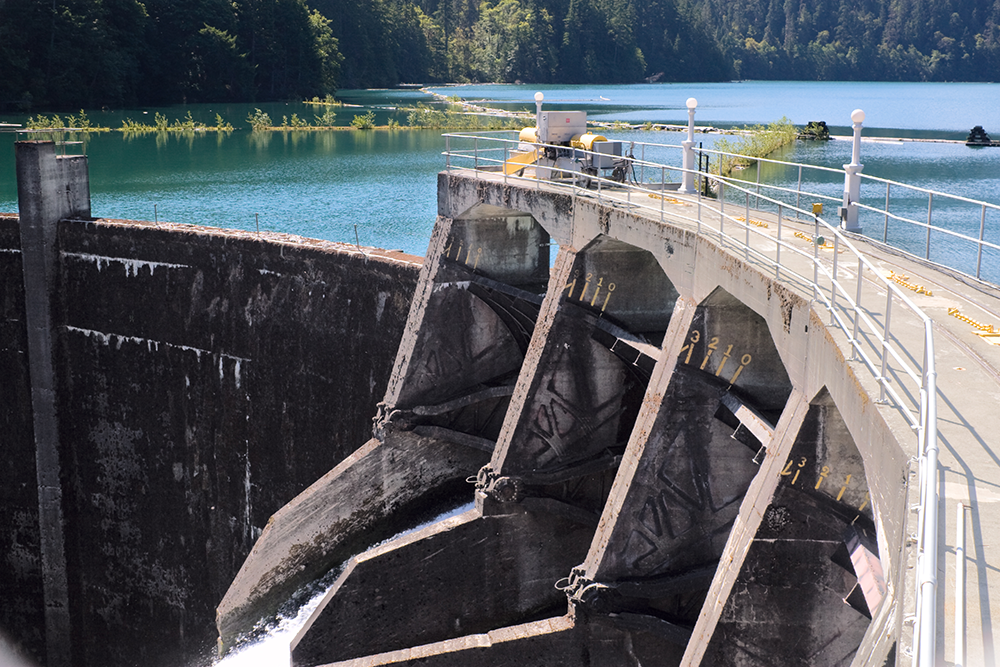
Two dams blocked Elwha River for over 100 years. (Photo: Bigstockphoto)
COLONEL: Alright, gang. Who wants to get the wettest?
[PARTICIPANTS VOLUNTEERING]
AHEARN: Colonel runs Olympic Raft and Kayak. He bought the company three years ago when he heard the Elwha dams were coming out and he’s had a front row seat to watch the recovery process ever since.
AHEARN: Colonel says the river’s changed a lot. New channels come and go as the Elwha twists back and forth across her bed, trying to find the fastest way to the Strait of Juan de Fuca.
COLONEL: We’re kinda just figuring it out a little bit as we go. Brand new river to pioneer.
AHEARN: Salmon are starting to come back. This summer, state fisheries biologists counted more than 1,500 King salmon above the former site of the lower dam, and the otters, eagles and bears are catching on.
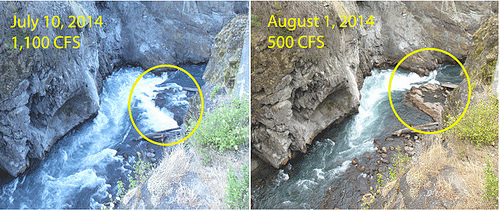
Un-damming of the Elwha River in Washington State (Photo: Ashley Ahearn)
We head into a rougher patch of river as Colonel tells a story about the demise of one sockeye salmon at the hands of a mama otter and her pups, not too long ago.
The otters cornered the fish in a small eddy of the river but it escaped and took off downstream.
COLONEL: That otter was on it. I mean, from the word “go,” that mom headed downstream, but then five minutes later she comes back up holding the sockeye by the mouth. And that sockeye was about as big as her.
[RUSHING WATER]
AHEARN: Millions of tons of sediment have been released from above the dams, creating sandy beaches where there used to be rocky shoreline.
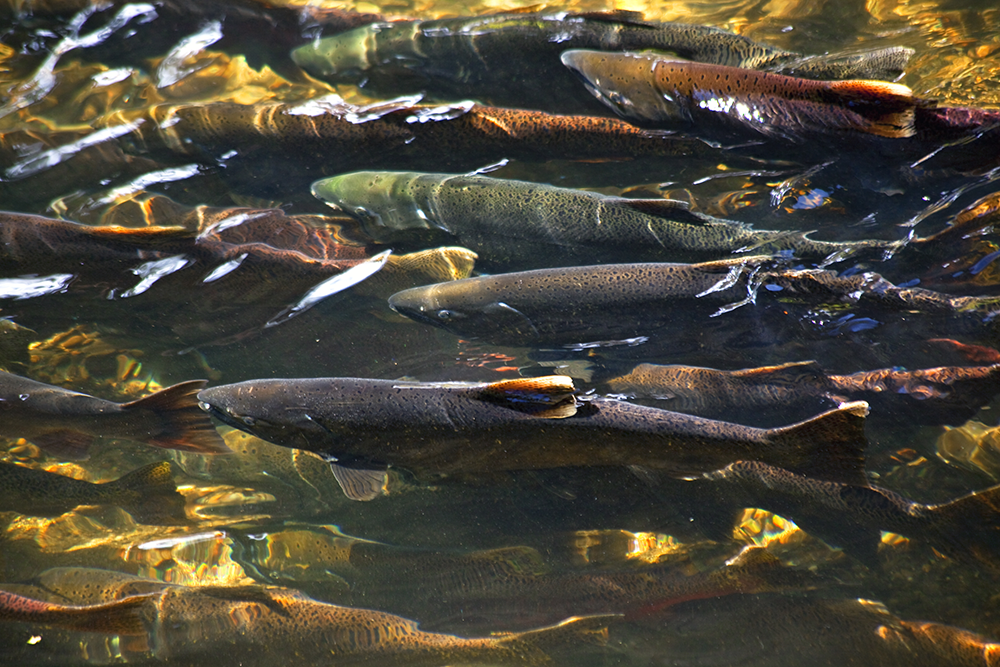
National Parks Services hopes to restore Elwha’s ecosystem. (Photo: Bigstockphoto)
AHEARN: Rob Elofson joined Colonel to run the river today. He’s a member of the Lower Elwha Klallam tribe, which has been pushing for dam removal for decades. This is the first time he’s rafted the river since the dams came down. As the group paddles along, Elofson points out that the river is already looking more salmon friendly.
ELOFSON: The small sediment, sand and gravel, wasn’t here. It was just large rocks. And yeah, it’s completely different. It’s the way it’s supposed to be now.
AHEARN: We round a bend and the water grows louder as it rushes into a tight curve, flashing with rolling white caps. This stretch of river is known as Ferngully, Colonel explains.
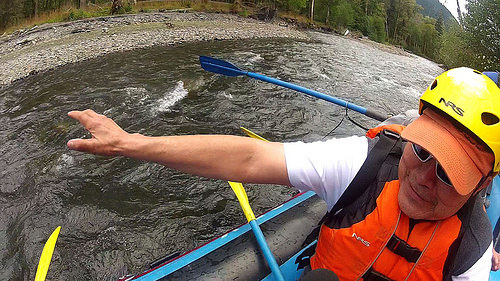
Rob Elofson on the Elwha (Photo: Ashley Ahearn)
COLONEL: This is going to be our best rapid of the day. This is the fun…can be class three in higher water; probably class two plus right now.
[WATER CRASHES]
AHEARN: We come out of Ferngully and the water slows, beautiful and clear beneath us. We’re above where the lower dam used to be, scanning the water for intrepid salmon, who have made it into this newly accessible territory to spawn. Nothing yet. We float quietly.
SCHMIDT: There’s one. I saw something shadowy.
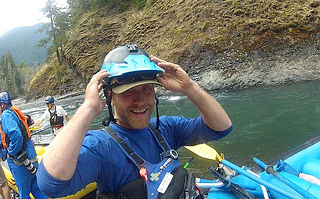
Morgan Colonel, owner of Olympic Raft and
Kayak, on the Elwha (Photo: Ashley Ahearn)
AHEARN: Kati Schmidt spots a sockeye salmon. She’s with the National Parks Conservation Association.
The gleaming flash of red darts beneath us, headed upstream and into the Ferngully rapids.
SCHMIDT: Ah! Yup! Yay! Go fish go!!
AHEARN: Now that the dams are gone, that sockeye could be the mother, the grandmother, and someday the great-grandmother of countless generations of salmon to come—all free to colonize the Elwha, once again.
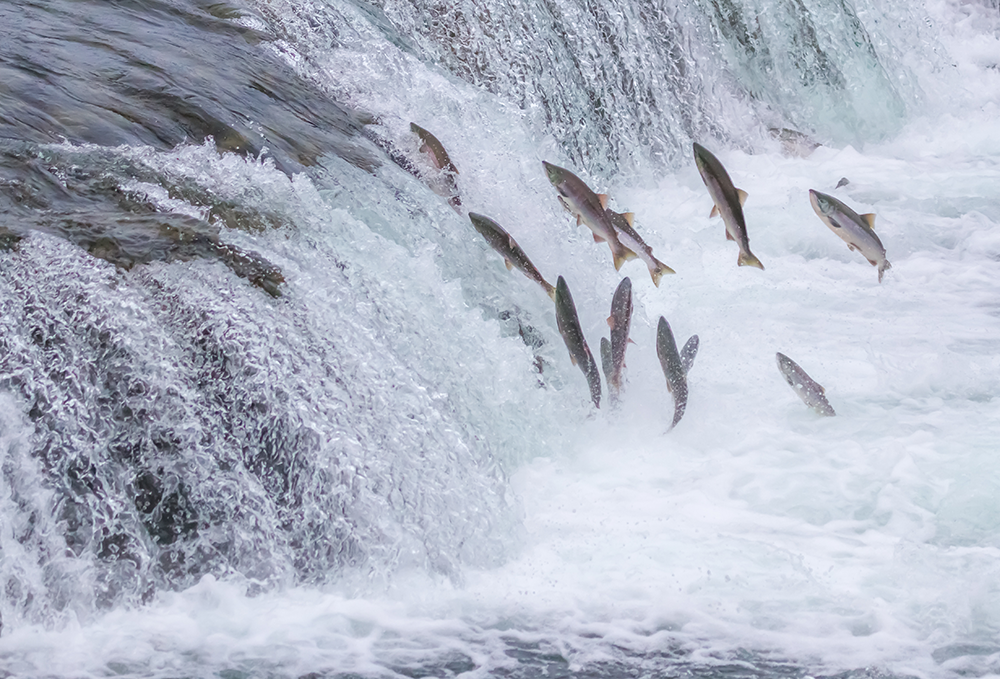
Since the removal of the first dam, the salmon have been coming back. (Photo: Bigstockphoto)
[RAFTS TOUCH DOWN]
AHEARN: Whew, we made it.
[FEMALE LAUGHTER]
AHEARN: I’m Ashley Ahearn on the Elwha River.
CURWOOD: To see a GoPro video from Ashley’s trip down the Elwha, paddle over to our website, LOE.org.
Links
Learn more about the Elwha River Restoration project from the National Parks Service.
Ashley Ahearn brought us into a hatchery in 2011 to explore another facet of this project.
Destruction of the first dam filled the river with sediment—and the fish thrived. Hear more here.
Living on Earth wants to hear from you!
Living on Earth
62 Calef Highway, Suite 212
Lee, NH 03861
Telephone: 617-287-4121
E-mail: comments@loe.org
Newsletter [Click here]
Donate to Living on Earth!
Living on Earth is an independent media program and relies entirely on contributions from listeners and institutions supporting public service. Please donate now to preserve an independent environmental voice.
NewsletterLiving on Earth offers a weekly delivery of the show's rundown to your mailbox. Sign up for our newsletter today!
 Sailors For The Sea: Be the change you want to sea.
Sailors For The Sea: Be the change you want to sea.
 The Grantham Foundation for the Protection of the Environment: Committed to protecting and improving the health of the global environment.
The Grantham Foundation for the Protection of the Environment: Committed to protecting and improving the health of the global environment.
 Contribute to Living on Earth and receive, as our gift to you, an archival print of one of Mark Seth Lender's extraordinary wildlife photographs. Follow the link to see Mark's current collection of photographs.
Contribute to Living on Earth and receive, as our gift to you, an archival print of one of Mark Seth Lender's extraordinary wildlife photographs. Follow the link to see Mark's current collection of photographs.
 Buy a signed copy of Mark Seth Lender's book Smeagull the Seagull & support Living on Earth
Buy a signed copy of Mark Seth Lender's book Smeagull the Seagull & support Living on Earth

